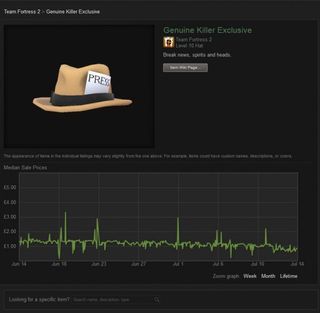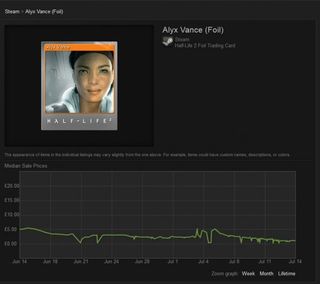Card shark: One man's quest to turn a profit from Steam card trading

You may remember the Killer Exclusive from issue 232 of PC Gamer, when we gave it away for free. It's been my treasured companion since that day, but you have to be merciless in this business. You can't have attachments. You've gotta keep moving forward, like a shark, or a bus with a really contrived time-sensitive bomb on board.
That sale released me from the penny-grabbing of the first few days of the experiment. From then on, I was one of the fat cats. The plan was simple: Watch the new queue for cheap foil cards, preferably worth less than £1, then quickly re-sell them for a 50% markup. That's 50 pence profit a time! I was rich! Which is to say I had around £6, which took me a couple of hours to earn. But it's hard to think about quibbles like "This is actually way less than minimum wage" when you're basking the warm glow of successful capitalism. I'd become obsessed my investments that the tea I'd poured when I sat down had already grown cold. No matter, I didn't deserve it. Tea is for closers .
After buying and selling several TF2 and Left4Dead foils I'd built myself a tidy plot of coins, but the highlight of the endeavour came when grabbed a cheap Half Life 2 booster pack and opened it up to find a foil Alyx Vance, worth a glorious £3. I was hot, I was on a roll. I was a shit King Midas, everything I touched turn to foil. Foil worth at least £1.50. I nearly had enough money for Rogue Legacy, but why should stop there? Why not double down? In retrospect, I think this was how Wall Street Bankers used to think in 2006.
I converted all my money into foils and booster packs, including my prize assets, two Gratuitous Space Battles foils picked up for as little as 60p and 70p and re-listed for £1.50. How could I lose? "This stuff never loses value, invest in foil today!" I thought as I filled out my application for The Apprentice.
Then the cards began to lose value. As more people found cards, they started relentlessly undercutting me in order to try and grab sales. This'll be that 'supply and demand' thing I've heard so much about. Every time I listed an item at a competitive price, a dozen more would rapidly be offered at a few pence cheaper. Cheap enough to drive prices down, but not so cheap that I could make any money from buying and re-selling. I rapidly grew to resent the competition, and with good reason, soon my margins were so small that speculation wasn't making me any money at all.
Of course I didn't admit that to myself. Instead I kept buying and selling cards nonetheless, making only pennies on each sale. The problem was the transaction fee. 15% of every sale is split between Valve and the game developer. This meant that to make money I need to make a big gain with every transaction, something that was becoming harder and harder as the prices fell. Even that lovely Alyx card was losing value faster than I could sell. The price dropped from £3 to £2.50 to £2 before eventually being sold for £1.50. Other cards were dropping in value so fast I ended up selling them at a loss.

Then there was there other problem. I still hadn't sold most of my original cards, I was hoarding them, hoping to make a set, despite knowing that they were pointless. I found myself wondering if it was worth crafting them to get more mystery cards, or for xp, or for any reason that would let me hold onto them. I was like a drug dealer sampling his own product. I'd made my fortune (£9) by realising that the cards weren't worth anything to me, and now I was losing it because I kept thinking they were.
The biggest gaming news, reviews and hardware deals
Keep up to date with the most important stories and the best deals, as picked by the PC Gamer team.
The lowest point? A friend asked me to trade cards. He didn't care about the money, he just wanted to make a set. I offered a couple of cheap G-Men and got some pricey Monaco and Company of Heroes cards in return. He made his set, and I took his sweet, valuable cards. What a great trade! That guy probably didn't even know the worth of what he was giving away! Awesome, I totally screwed over my friend!
Oh, wait. I stopped and took a look at myself. Was this really worth it?
I was done. I decided to offload all my cards, every last one. I cut prices hard, undercutting every other seller on the market. "Closing down sale! Everything must go! 20% shame discount!" Slowly those 15p and 16p cards began to add up, resulting in a total far higher than I'd expected. The numbers began to rise: £10, £12. £14. The big break came when the summer sale began and Mystery Cards turned into Summer Getaway cards, nearly doubling in price. They quickly fell back down of course, but not before I offloaded them onto those looking for a quick buy. Soon, it was all gone, and my grand total was £18.46. Not only enough for Rogue Legacy, but nearly enough for two copies, and all it took was a little piece of my soul. Well that and way more time an effort than it would have taken to make the same amount of money any other way. In the end, selling fast and playing recklessly made me the most money. More than enough to pick up a bunch of discounted indie treats in the Summer sale.
If you'd like to know how to make money from Steam Trading Cards without driving yourself insane, check out my How to Make Money from Steam Trading Cards article.
Most Popular


